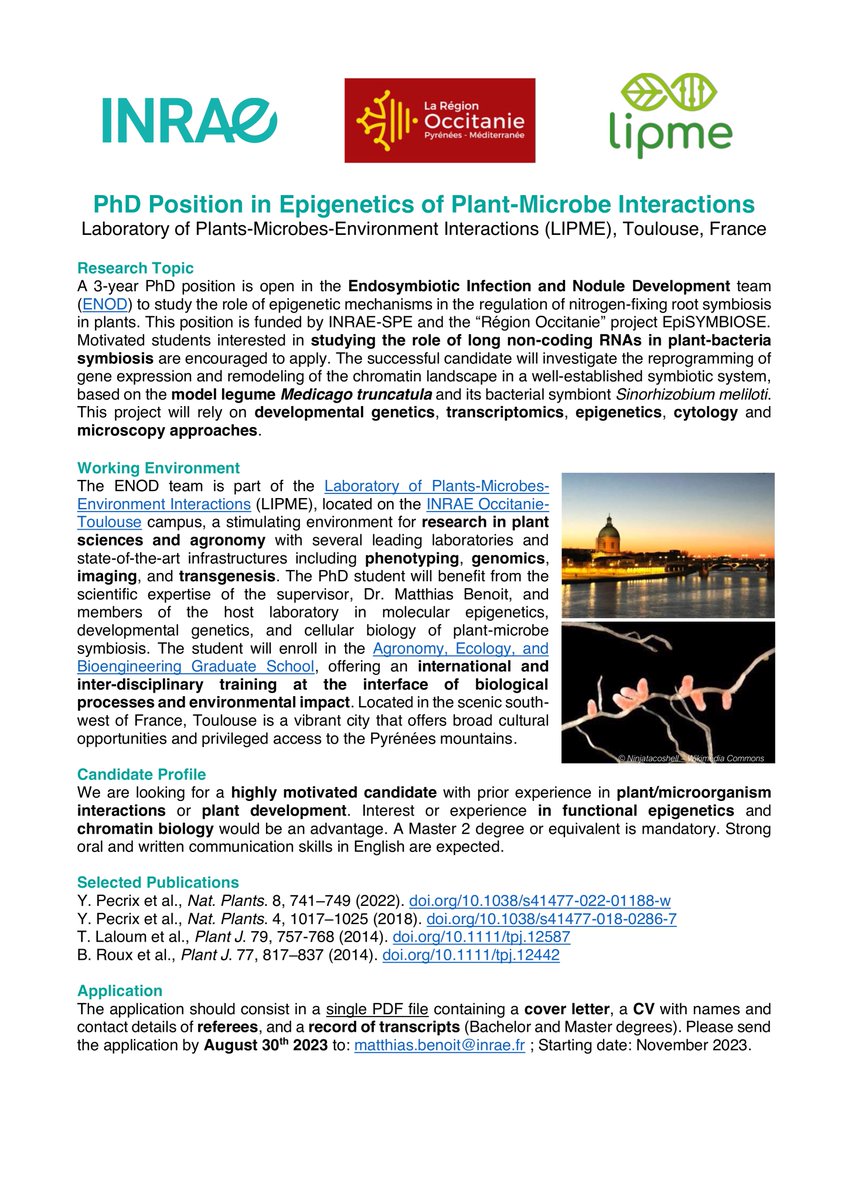PhD Position in Plant-Microbe Interactions: Embark on a journey of scientific discovery in the vibrant city of Toulouse, France! The Laboratory of Plants-Microbes-Environment Interactions (LIPME) invites applications for a 3-year PhD position in the Endosymbiotic Infection and Nodule Development team (ENOD). Explore the fascinating role of epigenetic mechanisms in regulating nitrogen-fixing root symbiosis in plants. This position is funded by INRAE-SPE and the “Région Occitanie” project EpiSYMBIOSE. We encourage motivated students interested in delving into the world of long non-coding RNAs in plant-bacteria symbiosis to apply. The successful candidate will investigate gene expression reprogramming and chromatin landscape remodeling in a well-established symbiotic system using the model legume Medicago truncatula and the bacterial symbiont Sinorhizobium meliloti. Join us to uncover the secrets of plant-microbe interactions through developmental genetics, transcriptomics, epigenetics, cytology, and microscopy.
Designation: PhD Researcher
Research Area: Epigenetics of Plant-Microbe Interactions
Location: Laboratory of Plants-Microbes-Environment Interactions (LIPME), Toulouse, France
| Research Topic | Role of Epigenetic Mechanisms in Root Symbiosis Regulation |
| Funding | INRAE-SPE and Région Occitanie project EpiSYMBIOSE |
| Working Environment | LIPME, INRAE Occitanie, Toulouse |
Eligibility/Qualification:
- Prior experience in plant-microorganism interactions or plant development.
- Interest or experience in functional epigenetics and chromatin biology (advantageous).
- Mandatory Master’s degree (Master 2 degree or equivalent).
- Strong communication skills in English (oral and written).
Job Description: The successful candidate will be part of the Endosymbiotic Infection and Nodule Development team at LIPME. The project focuses on the epigenetic regulation of nitrogen-fixing root symbiosis in plants. The PhD student will work with a well-established symbiotic system involving Medicago truncatula and Sinorhizobium meliloti. Using cutting-edge techniques in developmental genetics, transcriptomics, epigenetics, cytology, and microscopy, the student will investigate gene expression reprogramming and chromatin landscape remodeling.
Working Environment: LIPME offers a stimulating research environment at the INRAE Occitanie campus in Toulouse. Collaborate with experts in molecular epigenetics, developmental genetics, and cellular biology of plant-microbe symbiosis. Benefit from state-of-the-art facilities including phenotyping, genomics, imaging, and transgenesis. Engage in interdisciplinary training and join the Agronomy, Ecology, and Bioengineering Graduate School.
Application: Submit your application by August 30, 2023, as a single PDF file including:
- Cover letter
- CV with names and contact details of referees
- Transcripts (Bachelor and Master degrees)
Send your application to Matthias Benoit at matthias.benoit@inrae.fr.
Starting Date: November 2023










